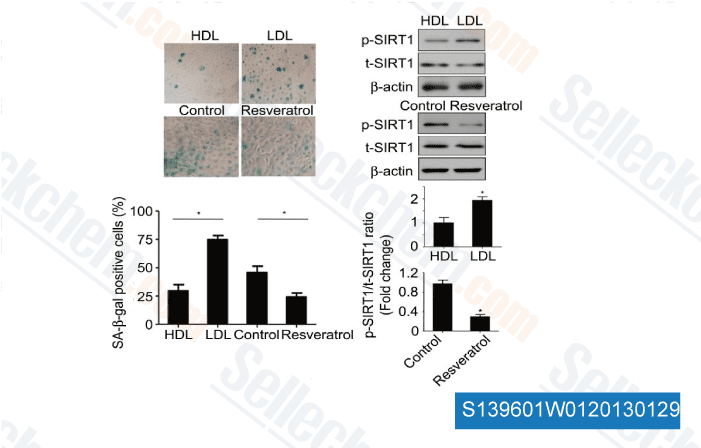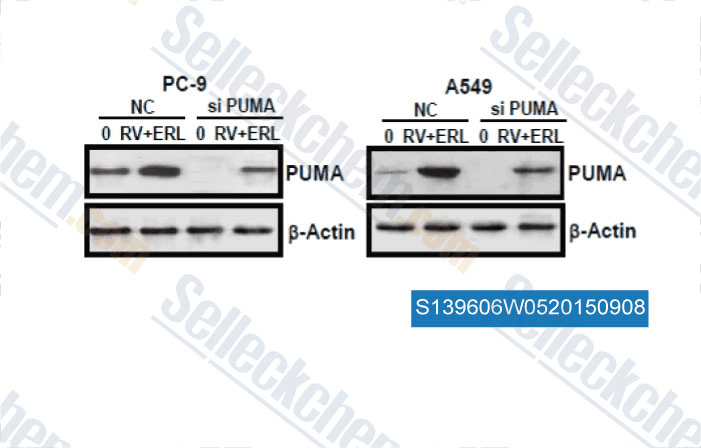|
Toll Free: (877) 796-6397 -- USA and Canada only -- |
Fax: +1-832-582-8590 Orders: +1-832-582-8158 |
Tech Support: +1-832-582-8158 Ext:3 Please provide your Order Number in the email. |
Technical Data
| Formula | C14H12O3 |
|||
| Molecular Weight | 228.24 | CAS No. | 501-36-0 | |
| Solubility (25°C)* | In vitro | DMSO | 45 mg/mL (197.16 mM) | |
| Water | Insoluble | |||
| Ethanol | Insoluble | |||
|
* <1 mg/ml means slightly soluble or insoluble. * Please note that Selleck tests the solubility of all compounds in-house, and the actual solubility may differ slightly from published values. This is normal and is due to slight batch-to-batch variations. * Room temperature shipping (Stability testing shows this product can be shipped without any cooling measures.) |
||||
Preparing Stock Solutions
Biological Activity
| Description | Resveratrol has a wide spectrum of targets including cyclooxygenases(i.e. COX, IC50=1.1 μM), lipooxygenases(LOX, IC50=2.7 μM), kinases, sirtuins and other proteins. It has anti-cancer, anti-inflammatory, blood-sugar-lowering and other beneficial cardiovascular effects. Resveratrol induces mitophagy/autophagy and autophagy-dependent apoptosis. | |||||||||||
|---|---|---|---|---|---|---|---|---|---|---|---|---|
| Targets |
|
|||||||||||
| In vitro | Resveratrol inhibits the activity of Cyclooxygenase and lipooxygenase, PKCs and p56lck, ERK1, JNK1, p38, IKK β, Src, STAT3, Ribonucleotide Reductase, DNA polymerases α and δ, PKD, PKC α, Quinone reductase 2, and Aromatase with IC50 of from 0.035-60 μM. Resveratrol is also an activator of Adenylyl cyclase and AMPK with EC50 of 0.8 μM and 50 μM, respectively. The roles of Resveratrol as inhibitor or activator enable its effects on decreasing cell inflammatory associated behaviors, growth inhibition and induction of apoptosis in cancer cells, reversal of endothelin-1 stimulated cell responses, inhibition of phorbol ester-induced expression of COX-2, inhibition of DNA synthesis in cell, resistance to menadione-induced cell death, and improvement of cell mitochondrial function and glucose/lipid metabolism. [1] Resveratrol is also an activator of sirtuins. Resveratrol lowers the Michaelis constant of SIRT1 for both the acetylated substrate and NAD+, and increases cell survival by stimulating SIRT1-dependent deacetylation of p53. In yeast, Resveratrol mimics calorie restriction by stimulating Sir2, increasing DNA stability and extending lifespan. [2] Resveratrol is effective at protecting isolated rat hearts against ischemia/reperfusion injury via its antioxidant activity, with improved recovery of developed pressure and aortic flow, reduction of malondialdehyde concentrations and reduction of infarct size. [3] | |||||||||||
| In vivo | Resveratrol improves health and survival of mice on a high-calorie diet. Resveratrol (22.4 mg/kg/day) shifts the physiology of middle-aged mice on a high-calorie diet towards that of mice on a standard diet and significantly increases their survival. Resveratrol produces changes associated with longer lifespan, including increased insulin sensitivity, reduced insulin-like growth factor-1 (IGF-I) levels, increased AMP-activated protein kinase (AMPK) and peroxisome proliferator-activated receptor-γcoactivator 1α(PGC-1α) activity, increased mitochondrial number, and improved motor function. Resveratrol opposed the effects of the high-calorie diet in 144 out of 153 significantly altered pathways. [3] Resveratrol has been shown to inhibit the initiation and growth of tumors in a wide variety of rodent cancer models. Dose of Resveratrol as low as 200 μg/kg daily already shows efficacy in a rat model of colon carcinogenesis. At higher dose of 40 mg/kg, Resveratrol increases the survival of mice with subcutaneous neuroblastomas from 0% to 70%. Resveratrol inhibits vascularization in the corneal micropocket assay in mice at a dose of only 48 μg/kg when administered daily. [3] Resveratrol shows beneficial effects on heart disease. Resveratrol blocks the increase in platelet aggregation induced by a hypercholesterolaemic diet. Resveratrol increase expression of both endothelial and inducible nitric oxide synthase. In stroke-prone, spontaneously hypertensive rats, resveratrol significantly reduces markers of oxidative stress such as glycated albumin in serum, and 8-hydroxyguanos-ine in urine. Providing Resveratrol in drinking water for 15 days (1 mg/kg) is sufficient to improve the recovery in function and coronary flow of isolated hearts. [3] Resveratrol displays anti-inflammatory activity in vivo. Resveratrol significantly reduces both acute and chronic chemically induced oedema, lipopolysaccharide-induced airway inflammation and osteoarthritis, and helps to prevent allograft rejection. Intravenously administered Resveratrol decreases inflammation induced by ischaemia/reperfusion, oxidants generated by hypoxanthine/xanthine oxidase (HX/XO) or platelet-activating factor, but not leukotriene B4 in rats. [3] Resveratrol shows beneficial effects on stroke and brain damage. Resveratrol administered intravenously significantly decreased ischaemic volume and brain water content at the extremely low doses of 100 ng/kg and 1 μg/kg after middle cerebral artery occlusion in rats. [5] |
Protocol (from reference)
| Cell Assay: |
|
|---|---|
| Animal Study: |
|
References
Customer Product Validation

-
, , Dr. Johanna Weiss of University Hospital Heidelberg

-
Data from [Data independently produced by , , Cell Physiol Biochem, 2015, 35: 2255-2271 ]
Selleck's Resveratrol has been cited by 68 publications
| Particulate matter-induced metabolic recoding of epigenetics in macrophages drives pathogenesis of chronic obstructive pulmonary disease [ J Hazard Mater, 2023, 10.1016/j.jhazmat.2023.132932] | PubMed: 37988864 |
| FOXO1 regulates Th17 cell-mediated hepatocellular carcinoma recurrence after hepatic ischemia-reperfusion injury [ Cell Death Dis, 2023, 14(6):367] | PubMed: 37330523 |
| Seasonal coronavirus infections trigger NLRP3 inflammasome activation in macrophages but is therapeutically targetable [ Antiviral Res, 2023, 216:105674] | PubMed: 37459896 |
| Resveratrol improves hepatic ischemia-reperfusion injury by inhibiting neutrophils via the ERK signaling pathway [ Biomed Pharmacother, 2023, 160:114358] | PubMed: 36739762 |
| AIFM2 promotes hepatocellular carcinoma metastasis by enhancing mitochondrial biogenesis through activation of SIRT1/PGC-1α signaling [ Oncogenesis, 2023, 12(1):46] | PubMed: 37735151 |
| AIFM2 promotes hepatocellular carcinoma metastasis by enhancing mitochondrial biogenesis through activation of SIRT1/PGC-1α signaling [ Oncogenesis, 2023, 10.1038/s41389-023-00491-1] | PubMed: 37735151 |
| Resveratrol induces major histocompatibility complex class I antigen presentation in a STING-dependent and independent manner in melanoma [ Mol Immunol, 2023, 163:188-195] | PubMed: 37837954 |
| High throughput drug screening identifies resveratrol as suppressor of hepatic SELENOP expression [ Redox Biol, 2022, 59:102592] | PubMed: 36586222 |
| Scale bar of aging trajectories for screening personal rejuvenation treatments [ Comput Struct Biotechnol J, 2022, 20:5750-5760] | PubMed: 36382193 |
| Resveratrol attenuates inflammation and apoptosis through alleviating endoplasmic reticulum stress via Akt/mTOR pathway in fungus-induced allergic airways inflammation [ Int Immunopharmacol, 2022, 103:108489] | PubMed: 34968999 |
RETURN POLICY
Selleck Chemical’s Unconditional Return Policy ensures a smooth online shopping experience for our customers. If you are in any way unsatisfied with your purchase, you may return any item(s) within 7 days of receiving it. In the event of product quality issues, either protocol related or product related problems, you may return any item(s) within 365 days from the original purchase date. Please follow the instructions below when returning products.
SHIPPING AND STORAGE
Selleck products are transported at room temperature. If you receive the product at room temperature, please rest assured, the Selleck Quality Inspection Department has conducted experiments to verify that the normal temperature placement of one month will not affect the biological activity of powder products. After collecting, please store the product according to the requirements described in the datasheet. Most Selleck products are stable under the recommended conditions.
NOT FOR HUMAN, VETERINARY DIAGNOSTIC OR THERAPEUTIC USE.
